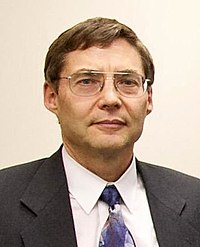Carl Wieman
| Carl Edwin Wieman | |
|---|---|
 |
|
| Born |
March 26, 1951 Corvallis, Oregon, U.S. |
| Nationality | United States |
| Fields | Physics |
| Institutions |
University of British Columbia University of Colorado Boulder University of Michigan |
| Alma mater |
MIT Stanford University |
| Doctoral advisor | Theodor W. Hänsch |
| Known for | Bose–Einstein condensate |
| Notable awards | E. O. Lawrence Award (1993) King Faisal International Prize in Science (1997) Lorentz Medal (1998) The Benjamin Franklin Medal (2000) Nobel Prize in Physics (2001) Oersted Medal (2007) |
Carl Edwin Wieman (born March 26, 1951) is an American physicist and educationist at Stanford University. In 1995, while at the University of Colorado, he and Eric Allin Cornell produced the first true Bose–Einstein condensate (BEC) and, in 2001, they and Wolfgang Ketterle (for further BEC studies) were awarded the Nobel Prize in Physics.
Wieman was born in Corvallis, Oregon to N. Orr Wieman and Alison Marjorie Fry in the United States and graduated from Corvallis High School. His paternal grandfather Henry Nelson Wieman was a religious philosopher of German descent and his mother had white Anglo-Saxon Protestant family background. Wieman earned his B.S. in 1973 from MIT and his Ph.D. from Stanford University in 1977; he was also awarded a Doctor of Science, honoris causa from the University of Chicago in 1997. He was awarded the Lorentz Medal in 1998. In 2001, he won the Nobel Prize in Physics, along with Eric Allin Cornell and Wolfgang Ketterle, for fundamental studies of the Bose-Einstein condensate. In 2004, he was named United States Professor of the Year among all doctoral and research universities.
...
Wikipedia
